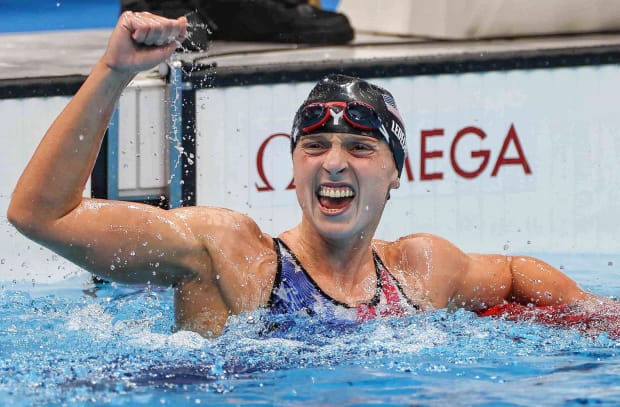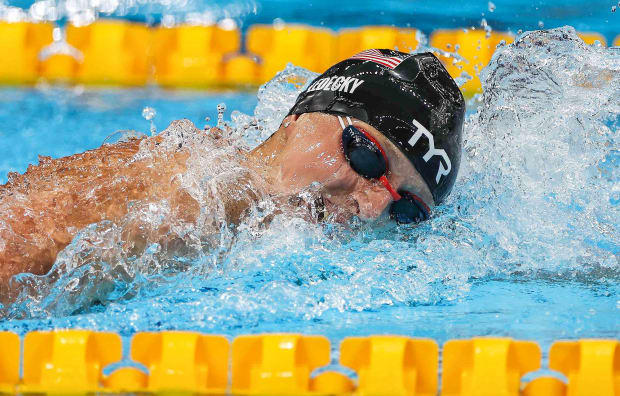After winning her first gold in Tokyo, the U.S. swimming star gave a raw and real inside look at the mindset of an Olympic great.
Sign up for our free daily Olympics newsletter:
Very Olympic Today. You'll catch up on the top stories, smaller events, things you may have missed while you were sleeping and links to the best writing from SI’s reporters on the ground in Tokyo.TOKYO — In February 2020, the Tokyo Olympics organizers unveiled the motto for these Summer Games: “United by Emotion.” They had no idea how prescient that would turn out to be. We are awash in strong feelings that run deeper than the thrill of victory and the agony of defeat.
In a span of mere hours, Olympic fans traversed a trail of tears with two of the biggest names here, Simone Biles and Katie Ledecky. Their emotions—and emotional state—have never been so starkly evident. The stresses, the highs, the lows: they are all laid bare for the world to absorb and assess.
We have never been deeper inside the hearts and minds of great Olympians. And while part of it almost feels intrusive, it shouldn’t. They took us there.
On Tuesday night Tokyo time, Biles acknowledged—abruptly and acutely and shockingly, while dropping out of the gymnastics team competition—the burden she carries living up to her own greatness. On Wednesday morning, Ledecky pretty much did the same.

The greatest female swimmer of all-time wept in the pool. Cried in the mixed zone. Choked up in her press conference. She’s more easily moved to tears than public perception may allow—she sobbed at the end of her epic 2016 Rio performance, and shed some tears at Olympic Trials last month—but this still was extraordinary. It was a raw glimpse into a growing and evolving young woman as she processes the hardest of her three Olympic competitions.
For the first time as an Olympian, she was badly beaten Wednesday morning. She finished fifth in the 200-meter freestyle, an event she won in 2016. She wasn’t expected to win this time, but a silver medal certainly seemed within reach. Missing the podium by 1.71 seconds in the shortest of her four individual races was a shock; when combined with a silver medal in the 400-meter freestyle on Monday, it was downright disorienting.
But then Ledecky regrouped and won the 1,500-meter freestyle, with American teammate Erica Sullivan charging hard for silver. Ledecky’s time was not extraordinary by her standards, which in that event are not the same standards as the rest of humanity. But the recovery and return to dominance mattered more than the time. And the reaction was different from any of her previous five gold medals.
Ledecky waited for teammate Sullivan to finish, then slapped her hand down on the water in celebration of them both. They embraced, and suddenly Ledecky was crying.
That moment was a hint at what she and Biles probably know better than any two athletes here: how hard it can be lugging perfection around on your shoulders every day. “I would never want to speak for Simone and say that I know what she’s feeling, because none of us do,” Ledecky said. “But I understand it.”
An existence in which any weakness comes as a shock, and excellence is the minimum requirement, is not easy. Especially as the evidence mounts that the performance in Rio, when she won everything and broke records, was a peak that probably won’t be scaled again.
“I’m always striving to be better than I’ve ever been, and it’s not easy when your times are world records,” Ledecky said, during what certainly was her most unguarded press conference ever at the Olympics. “I’m really tough on myself. But that’s the attitude I have—I literally approach each race with a belief that I can swim a best time, and that’s pretty darned tough. But that’s why I’ve been so successful over the years, because I approach every single race with the attitude that anything can happen, and I can break world records this race. I’m going to step up and throw down.
“It’s a real blessing and a curse to have that attitude. It’s served me well and it’s why I’ve broken so many world records and swam so many fast times. It’s also really hard attitude to maintain for nine years.”

Ledecky has learned to coexist with that duality, that self-created conflict. She badly wants to win every time, but also can deal with a silver medal when she swims her second-best time in the 400-meter freestyle.
What she would like now is for the outside world to join her in that coexistence. Cheer the wins, but don’t treat the losses as some sort of calamity.
“I’m kind of at peace with it,” she said. “I kind of laugh when I see things like ‘settles for silver.’ There’s so many Olympians that have won silver and bronze that are really happy with that, and deserve a lot of praise. Just because I’ve won golds all the time, that doesn’t mean silver doesn’t mean something to me.
“I don’t want anybody to feel sorry for me, or think that a silver medal is a disappointment or anything. I’d much rather people be concerned about people who are truly struggling in life. It’s such a privilege to be in an Olympics, much less an Olympics in the middle of a pandemic. I’m lucky to be here.”
As she often has done, Ledecky psychologically leaned on family after the shock of her fifth-place finish in the 200. Her coach, Greg Meehan, gave her a few minutes to process it before sending her into the warm-down pool to get ready for the 1,500. While slowly turning laps, Ledecky thought of her grandparents—her deceased grandfathers, her living but aged grandmothers, both of whom she very much wants to visit after the Olympics for the first time since before the pandemic.
“Four of the toughest people I know,” she said, using their struggles as a speed primer on bouncing back.
Then she went out and did what she does better than any female in history—turning lap after lap after lap and leaving everyone behind. When she stood on the top podium, she remembered everything that has come along with being there before.
“I was thinking of the power of the gold medal and what I’ve experienced over the years, how I’ve gone to children’s hospitals and met wounded warriors and their faces light up when they see the gold medal. That means more to me than anything, the ability to put a smile on someone’s face. I still wanted to get a gold medal to have that opportunity again.”
Her voice cracked at that point, and for the third time this day there were tears in her eyes. Katie Ledecky didn’t try to hide that from anyone, just as Simone Biles did not shield us from her moment of doubt at the gymnastics venue the night before. We’ve never seen our Olympic heroes like this before, emotions running deep, but also right there for the viewing—and, hopefully, the understanding.
More Olympics Coverage:
• The USWNT's Off-Brand Olympics
• Sue Bird Seeks Historic Fifth Olympic Gold Medal in Tokyo
• Fencing’s Rich History With the Grisly—But Dignified!—Art of Dueling
• Biles, Osaka Signal New Era of Prioritizing Mental Health
No comments:
Post a Comment